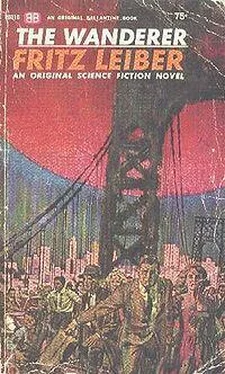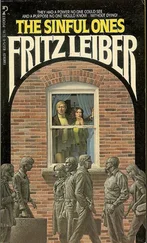The next instant, without the faintest shock or jar and with all the impossible feel of dream flying, the Baba Yaga came to a dead stop no more than a dozen feet above a dull silver pavement — so close to it, in fact, that Don could see designs etched on its surface: a whirlingly complex arabesque with bands of hieroglyphics.
Still weightless, he hovered above the spacescreen and goggled down through it, feeling like a fish looking through a window in the floor of its aquarium.
Then, as if a couple of verniers had been fired or a giant hand had grasped it, the Baba Yaga began to upend. Don grabbed at the pilot’s seat to steady himself.
The motion stopped halfway around, when the ship’s main jet would be pointing at the pavement below. Gradually then a gravity field took hold of him and the ship. He heard three faint thumps and simultaneously felt three gentle jolts as the three legs of his ship footed themselves. He clutched the seat tighter as his weight grew until, so far as he could judge after a month on the moon, it was as much or almost as much as it had been on Earth. Then his weight stopped growing.
But he noted these things with a lower fraction of his mind only, for his main attention was absorbed by the view the spacescreen now gave him of the Wanderer’s sky — the underside of the film through which he had broken some forty seconds ago.
Between him and it, the small dark clouds — darker now since he could no longer see the gleaming eggs they nested — sailed steadily past, much as small clouds move across the deserts of the American Southwest before a steady west wind, withholding their rain. At no time did they obscure more than an eighth of the sky. Nor did the down-rushing rock pillar, now tapering up to a point high as the sky itself, its triangle reversed, obscure more than another eighth.
That sky was neither pale violet nor yellow, nor dead black anywhere, nor did it show any stars. It was instead a slow swirling of all dark colors, a dusky rainbow storm sky sweeping along in ever-changing hues and curving patterns. It had the harmony and grandeur and menace of a perpetual color-symphony, yet it seemed natural, promising endless vital variations. Whether its light came mostly from itself, or from that thrown upward by the now-concealed globes on the clouds, or from some other indirect source, Don could not tell. It resembled somewhat the marbling of a film of oil on water, and somewhat Van Gogh’s wild painting, “The Starry Night,” and even more the deep, glinting hues that flow churningly past the mind’s eye in the dark.
Just as he was thinking that last thought, which seemed to put him on the inside of some vast mind, he heard a tiny grating sound which chilled his blood. He looked down quickly enough to see the last of the dogs on the hatch move aside by itself and the hatch lift without visible agency, showing him the empty ladder moving down out of its housing to the empty silver pavement below.
Then a voice, strangely sweet and cajoling, called to him in only slightly slurred English: “Come! Unsuit yourself and come down!”
Australia, Indonesia, the Philippines, Japan, and the eastern parts of China and Siberia had now swung into Earth’s night side. The Wanderer, often first seen as the yin-yang or the mandala, set religious and mystical strings vibrating in millions of minds. And East Asian voices were added to the American ones warning the cluster of skeptical old continents to the west — the world’s cultural heartland — of what they would see at nightfall.
Paul Hagbolt had grown very tired of his bondage and peculiarly bored with his spread-eagled reflection, and the invisible sun had dried his front completely, when he spotted two cryptic cat faces peering at him from a stretch of flowerbank by the control panel beyond his feet. The one was Miaow’s, the other was large as his own. They came floating forward from the gloom, and their bodies after their faces with a sinuous grace that hardly quivered a single pink petal or green spear, until they were barely emerged from the flowers — whereupon without further glance, at him they settled themselves in the air facing each other, so that he saw them in profile.
The tiger-being held out Miaow facing her, cradling the little gray cat on one spread paw and slim green secondary forearm — Paul realized that the second elbow which had terrified him was simply the normal feline wrist above the elongated palm bones that make a secondary forearm above the paw.
Miaow’s fur was now fluffy dry, and she lolled on her back, fantastically at ease, gray tail draped over violet-barred wrist, staring gravely into the great, violet-petalled eyes of her captor — or rather, her new friend, to judge from appearances.
They looked remarkably like mother and tiny child.
Paul’s feelings about the tiger-being, his very picture of her, underwent rapid changes as he watched her in repose — this time he thought of her from the first as “she,” an assumption bastioned by the apparent absence of external sex organs, except for two modest, indigo-ruddy nipples high in the green fur of her chest.
For a feline, she was short-bodied, long-legged, long-armed — in build more like a cheetah than any other terrestrial cat, though considerably larger: human size. The general proportions, too, were more human than feline — he guessed that in gravity she would be at least as much biped as quadruped.
The fur of her throat, chest, underbelly, and the insides of her arms and legs was green, the rest, green barred with violet.
Her head was prick-eared as any cat’s, but with a higher and broader forehead, seeming to increase the triangularity of the whole face, which was nevertheless completely feline, even to indigo button-nose and pale whisker hairs. Here the fur was violet except for a green mask across the eyes.
Despite the secondary forearms above them, the slim paws looked quite like hands now — three-fingered hands with an opposed thumb. The claws were invisible, presumably retracted and sheathed.
The violet-barred green tail swung gracefully over a half-bent hind leg.
The total effect, he realized suddenly — even the tail! — was now very close to that of a slim, tall woman dressed in a skintight fur costume for some fantastic cat-ballet. He felt a disturbing pang as he had that thought.
And just at that moment the tiger-being began to speak in English — clipped and exotically slurred, yet English nevertheless — not directing her speech toward him but to Miaow.
It was all so “impossible” that Paul listened as if in a dream.
“Come, little one,” the tiger-being said, poutingly parting only the two central inches of her mulberry lips. “We friends now. No need be shy.”
Miaow continued to stare at her gravely, contentedly.
“You me same folk,” the tiger-being continued winningly. “You easeful now, I feel. So speak. Ask question.”
A pause, with Paul feeling on the verge of understanding the fantastic cross-purposes that had begun to operate. Then the tiger-being said: “You shy one! You want front names? I know yours. Mine? — Tigerishka! Name I invent especially for you. You think me terrible tiger, also beautiful toes dancer. Toes dancers call selves, ‘-enska, -skaya, -ishka.’ Tigerishka!”
Then Paul understood. It was the super-error of a super-being. Tigerishka had been reading his thoughts to the point of learning his language in seconds, but all the while attributing those thoughts to her fellow-feline Miaow.
At the same time he realized what the disturbing pang had been: plain male desire for a thrillingly attractive she-being.
Tigerishka must have caught that thought, too, for she waved an indigo-padded finger at Miaow in playful reproof and said: “You have naughty feelings about me, little one. Really, you not big enough — and we both girls! Come now, speak…Paul…”
Читать дальше










